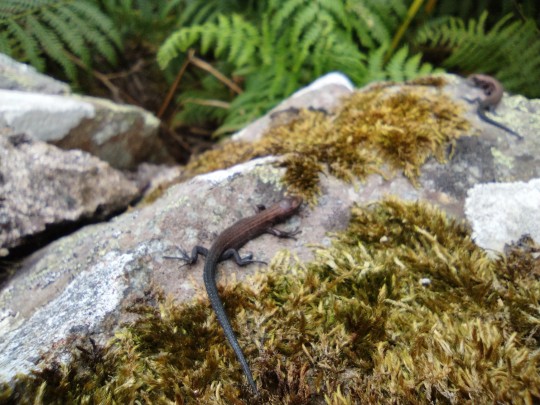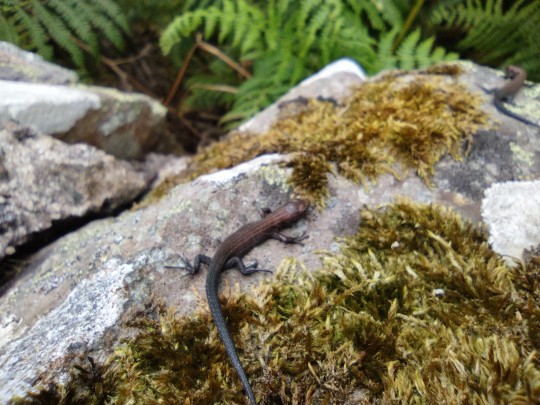#zootoca vivipara
Explore tagged Tumblr posts
Text




Лучше попугая на плече только лесная гостья-живородящая ящерица (лат. Zootoca vivipara). Май 24. The only thing better than a parrot on the shoulder is the forest guest-viviparous lizard (lat. Zootoca vivipara). May 24.
#русский tumblr#Россия#природа#весна#загородом#лес#пресмыкающиеся#живородящая ящерица#солнечныйдень#мои фото#Russia#nature#nature photography#spring#sunny day#forest#reptiles#viviparous lizard#Zootoca vivipara#my photos#nature photopragpy#original photography#photographers on tumblr
184 notes
·
View notes
Text


174 notes
·
View notes
Note
Hi!! Hello! Dane here. I have a question that might be really dumb and silly- but basically the area I live in, at least when I was a kid (it’s been a while since I’ve gone lookin’) has a lot of firben (not sure which kind sorry) who are all-black? I’m aware that melanistic reptiles and amphibians aren’t that rare but I always wondered what this specific species of firben was. But since they were all all-black I could never figure it out!
All I can tell is I live near a pond with tall vegetation, far from other large water sources, and the lil guys were 4-8cm long?
Oh and it’s in Jylland!! Do you have any good places for looking up these little fellas? I’m sure they were just a really common type of firben that had a bit of a limited gene pool and for some reason black was advantageous in the little pond, but I vaguely remember the texture of their skin and such and it’s been buggin me for YEARS! So if you have anything to help me end my search: thank you 😭
Hej! This is probably a population of melanistic Zootoca vivipara, given the habitat you describe This might indeed have been a coincidence caused by population drift in a small population. It wouldn't even need to be beneficial, just not actively detrimental.
96 notes
·
View notes
Text

A viviparous lizard (Zootoca vivipara) in Sweden
by Hanna Knutsson
#viviparous lizard#lizards#reptiles#zootoca vivipara#zootoca#lacertidae#squamata#reptilia#chordata#wildlife: sweden#wildlife: europe
84 notes
·
View notes
Text

Common Lizard
A small common lizard, with a missing tail, sunbathing on a bramble leaf at Glapthorn Cow Pastures.
#animal#animals#canon#canonuk#common lizard#glapthorn#glapthorn cow pastures#lizard#nature#nature reserve#northamptonshire#northants#outdoors#reptile#reptiles#viviparous lizard#wildlife#wildlife trust#wildlife trusts#woodland#woods#zootoca vivipara
3 notes
·
View notes
Text


Zootoca vivipara (viviparous lizard)
#Zootoca vivipara#viviparous lizard#common lizard#lizard#polish animal#wild animals#animal lover#reptile#animal photoshoot#animal photography#animal#wildlife photography#wildlife pictures#wildlife#beautiful#beautiful photos#my photo#photography#photooftheday#naturecore#photoart#forest#woods#forest view#walking in nature#nature#goblincore#goblin aesthetic#goblin community#green energy
19 notes
·
View notes
Text

Skovfirben (Zootoca vivipara)
Viviparous Lizard (Zootoca vivipara)
#Skovfirben#Zootoca vivipara#Zootoca#Viviparous Lizard#Lizard#Firben#Krybdyr#Reptil#Reptile#Almindelig Firben#Lacertidae#Forår#Spring#Bygholm Vejle
3 notes
·
View notes
Text



Newly hatched common lizards (Zootoca vivipara) on Greater Cumbrae, likely no more than a week old
3 notes
·
View notes
Video
Viviparous Lizard (Zootoca vivipara) by Will Atkins Via Flickr: female
#Viviparous Lizard#Common Lizard#Zootoca vivipara#Zootoca#lacertid#Lacertidae#Wildlife#Wildlife of Europe#European Wildlife#Animal#Nature#animal portrait#reptiles#reptile#reptiles of Europe#European reptiles#lizard#Lizards#Lizards of Europe#British Wildlife#British amphibians and reptiles#British reptiles and amphibians#British reptiles#British lizards#UK wildlife#UK reptiles and amphibians#UK amphibians and reptiles#UK reptiles#UK lizards#Dorset wildlife
1 note
·
View note
Note
Do you know about reptiles native to the Netherlands? I feel like we don't have many here because of the cold, wet climate :(
Dutch Reptiles:
Hello yes, there are a few reptiles found in the Netherlands. Here are a few of them...

European Pond Turtle (Emys orbicularis), family Emydidae, found
This species is only found in the border areas of the country and is very uncommon there.
photograph by Bernard DUPONT


Slow Worm (Anguis fragilis), family Anguidae
Also called Blindworm and Hazelworm.
Legless lizard.
photographs by Julien


Sand Lizard (Lacerta agilis), family Lacertidae
T - female, R - male
photographs by George Chernilevsky

Viviparous Lizard (Zootoca vivipara), family Lacertidae, Aamsveen, The Netherlands
photograph by Ocrdu

Smooth Snake (Coronella austriaca), family Colubridae
photograph by Mihai Si Furia Rosie

Grass Snake (Natrix natrix), family Colubridae
aka Ringed Snake or Water Snake
photograph by Mark Ollett

Common European Adder (Vipera berus), family Viperidae
photograph Benny Trapp
154 notes
·
View notes
Text

Wall lizard (Podarcis muralis) ; Sand lizard (Lacerta agilis) ; Viviparous lizard (Zootoca vivipara)
Reptiles and Amphibians of the World. Written by Hans Hvass. Illustrated by Wilhelm Eigener. Originally published in 1958.
Internet Archive
152 notes
·
View notes
Text

54 notes
·
View notes
Text
Day 51 of posting cute creatures we found on our field trip:

Viviparous lizard (Zootoca vivipara) is the smallest European lizard. This is an adult female, they don’t get bigger than this. These lizards prefer to live in cold climate and on high mountains. They can be found in Scandinavia and Northern Europe, the Alps and all mountain ranges in Balkans. They adapted to cold climate and long winters by live bearing and being tiny.
This is the last creature we found! I hope you enjoyed this “series” and fun facts about all the animals we met.
21 notes
·
View notes
Note
I'm really sorry if you already answered but I did look through the whole lexicon and used control+f. Do we have words for Lizards/Newts//Salamanders/Reptiles?
I wanted to see the Clanmew names for 2 OCs Lizardsong and Salamanderclaw. The second being a Skyclan Daylight Warrior!
The word for reptile is "Skeep"! It is a wingless, typically scaled animal without fish "wings". So, it actually includes amphibians as well. This is because there are very few reptiles in the UK; Clan cats don't see why an amphibian is not simply a water-reptile.
So to them, a lizard is a four-legged reptile with a tail. It includes all of the newts that they encounter on a regular basis, even though these are technically amphibians. What are you gonna do, teach the cats cladistics?
Lizard (Generic) = Ssassa Adult newts and lizards, without breeding season adornments. Has 6 species.
Sail (of a fish or a breeding male newt) = Saoss The dorsal fins on top of a fish or a breeding male newt.
Viviparous Lizard (Zootoca vivipara) = Sipssa Eggs are much rarer in this part of the world than you might think. Like its name suggests, the viviparous lizard typically gives live birth, which is likened to the adder. This is the most common lizard in the area, encountered by all Clans.
Sand Lizard (Lacerta agilis) = Hwoossa Named for being seen mostly in WindClan's sandy lowland heath, because this IS an animal that lays eggs. It needs sunny, sandy areas to be able to hatch a brood.
Smooth Newt (Lissotriton vulgaris) = Fyenssa A contraction of "Flame's Lizard," for the quirk where these newts will often hide in piles of cold, wet wood, only to flee out when a fire is lit. The most common newt to encounter, feel free to translate as "salamander!"
Palmate Newt (Lissotriton helveticus) = Horrssa The "shade newt," so named because this one generally prefers forested, green areas. Its tail is much fatter than the other newts.
Great Crested Newt (Triturus cristatus) = Gisis What was once the Tribemew word for all lizards now only describes the great crested newt, the largest and most respected of the "lizard" classification. An accomplished hunter with an impressive sail during its breeding season, on both the back and the tail.
Some extra facts about newts and lizards in general...
Scientifically, all newts are salamanders, but not all salamanders are newts. You could translate any one of these words as "salamander."
Through their lives, newts will have terrestrial phases and aquatic phases.
Britain's cold climate and isolation as an island means there are very few reptiles in general; amphibian species outnumber them because it is very wet.
Slowworms are technically a lizard, but Clan cats believe they are a snake.
Clan cats also believe that snakes were not originally reptiles, but worms. There is a story about a cat who hunted them to extinction and then had to recreate them from memory, forgetting that worms don't have scales.
58 notes
·
View notes
Text

Common lizard (Zootoca vivipara)
#Zootoca vivipara#viviparous lizard#common lizard#lizard#reptile#animal photoshoot#animal lover#animal#polish animal#animal photography#wild animals#wildlife#wildlife pictures#wildlife photography#fauna#beautiful#beautiful photos#my photo#photography#photooftheday#naturecore#photoart
4 notes
·
View notes

